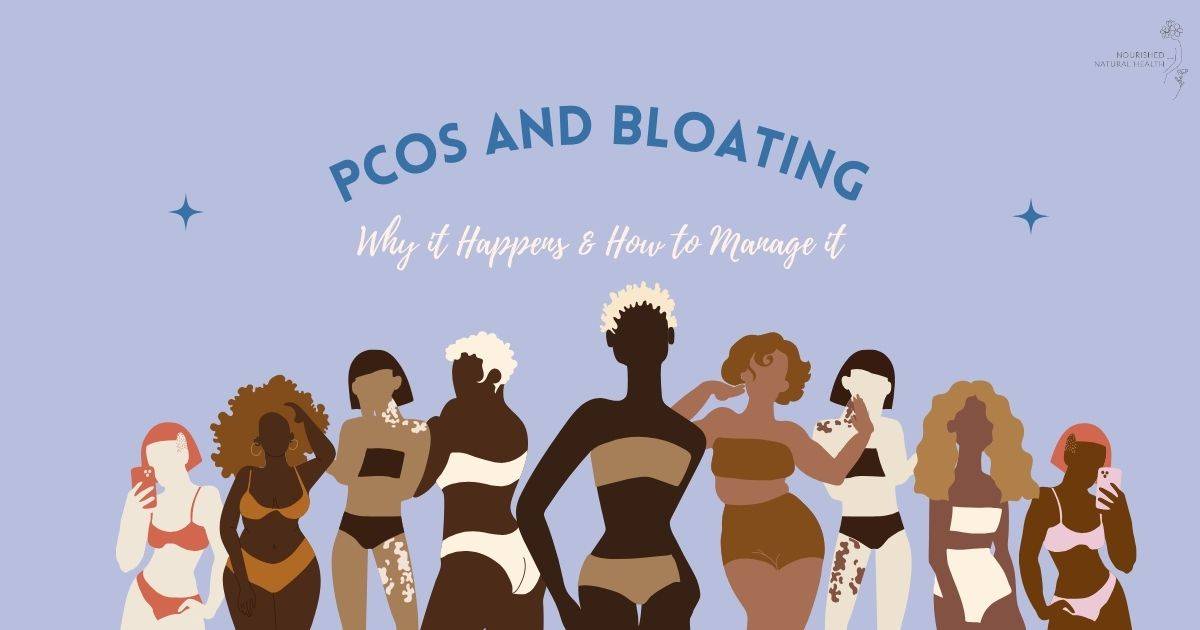
PCOS Bloating
If your belly sometimes feels full and tight after a meal, you are most likely experiencing bloating — a condition generally caused by trapped gas or retention of fluids.
Sometimes, a distended (larger) abdomen can also be felt along with bloating.
However, bloating can also be a symptom of polycystic ovary syndrome (PCOS) and can manifest as an unpleasant feeling of fullness or tightness in the abdomen.
PCOS is a whole-body condition that causes several symptoms, hence the name “syndrome.”
According to research, there’s a strong link between PCOS development and the gut, especially changes in the amount and diversity of bacteria in the gut.
This may explain the link between bloating and PCOS, which reportedly affects about 70% of the represented population in several studies.
Understanding PCOS and Bloating
Pathophysiology of PCOS
PCOS affects several body functions, not just the ovaries.
It’s called a syndrome because it is characterized by several different symptoms rather than just being a single disease.
It’s a common misconception that all women with PCOS have ovarian cysts—this isn’t always the case.
Despite the term “cysts” in the name, a lot of women with PCOS actually have underdeveloped follicles, or “baby eggs,” that fail to mature and result in ovulation.
This is because of the hormonal imbalances typically associated with PCOS.
Many PCOS symptoms are closely related to excess androgen production or male hormones like testosterone.
These hormones cause a lot of the notorious symptoms of PCOS, like irregular periods, acne, hair loss, and excess facial hair.
In excess, androgens can throw off hormonal balance, and women with PCOS usually find that their cycles are much longer (35 days or more) and that their periods are more irregular.
PCOS may be identified by doing an ultrasound to check for polycystic ovaries or diagnosed via physical exams and blood tests.
How PCOS Contributes to Bloating
What are the different factors that may cause PCOS bloating?
Hormonal Imbalances
During a regular menstrual cycle, a woman usually has more progesterone compared to estrogen post-ovulation.
Progesterone is a natural hormonal diuretic, which means that it can help the body release excess fluids.
Lack of ovulation, or anovulation, is a common PCOS symptom.
Typically, if ovulation doesn’t happen, the body may be unable to make enough progesterone—leading to water retention and subsequent bloating.
According to a study, hormonal changes can cause bloating in women with PCOS due to these hormonal changes, as they also affect gut bacteria and bile acids responsible for digestion.
Insulin Resistance and its Role in Bloating
About 80% of PCOS women are predisposed to insulin resistance, which can make managing cravings for sweets and carbohydrates a bit challenging.
Consumption of excess carbohydrates may worsen insulin resistance and cause symptoms like constipation, diarrhea, flatulence, nausea, vomiting, and bloating.
The Impact of Chronic Inflammation
Chronic inflammation within the digestive tract can affect how the digestive system moves, also called “gut motility,” eventually leading to bloating, abdominal distention, slowed digestion, and cramping.
A lot of people with PCOS have low-grade levels of inflammation in the body, making bloating a common occurrence, especially among those with higher inflammatory markers.
The Role of Diet and Nutrition
Dietary Triggers for Bloating in PCOS
Sugar, dairy, and gluten are all known causes of inflammation, as they also elevate cortisol levels and lead to bloating.
Consuming these types of foods can exacerbate bloating, especially if you’re intolerant to dairy or gluten.
Taking a food intolerance test or cutting out these foods one by one can help you identify your triggers to avoid bloating and inflammation.
Nutritional Strategies to Reduce Bloating
Following a low glycemic index (GI) diet or consuming foods that don’t spike your blood sugar—can help prevent bloating.
Additionally, you should consume more fiber-rich foods like vegetables, fruits, and whole grains to naturally detoxify excess toxins and hormones.
Adding probiotic foods like kimchi, yogurt, and sauerkraut may also be beneficial in providing healthy gut bacteria to help support your digestion and reduce bloating.
Cutting your sugar intake can also reduce gas and bloating.
How Supplements Can Aid in Managing PCOS and Bloating
Supplements can naturally support your body and aid digestion.
Here are some of the most beneficial ones:
Ginger
Ginger has long been used to treat stomach troubles and is still a powerful supplement.
It can help reduce feelings of nausea and quicken the movement of food through the digestive tract, as well as protect the gut.
It, therefore, helps prevent bloating, gas, and cramps.
L-Glutamine
L-glutamine helps the body make tissues, as it is an amino acid that helps to repair and strengthen the intestinal lining.
This helps to reduce inflammation, balance gut bacteria, and prevent bloating.
Psyllium
Psyllium can benefit PCOS cysters with inflammation and constipation, as it is an excellent source of soluble fiber.
It can also help lower blood sugar levels and cholesterol.
Natural PCOS Supplements
At Nourished Natural Health, our mission is to address PCOS symptoms naturally through well-researched and carefully made supplements.
Supplements support critical bodily processes that affect PCOS, like insulin signaling, insulin resistance, and fat metabolism.
Products of thousands of hours of research, our supplements have been proven safe and effective.
They have helped more than 40,000 cysters regain control of their bodies and seek support from the Cysterhood, a safe space to connect with like-minded individuals.
Lifestyle Changes to Help Manage PCOS Bloating
What can be done to minimize PCOS bloating?
Exercise and Its Benefits for PCOS and Bloating
Not only does exercise help lower body fat, but it can also help build muscle mass—which can do wonders for your insulin resistance.
Regular exercise also lowers cholesterol levels and male hormones like testosterone and cortisol.
It's essential to find your ideal exercise based on preference and fitness level to stay consistent.
Aim for 30 minutes to 1 hour of moderate exercise at least thrice a week, and see which movements work best for you.
Stress Management Techniques
Mindfulness exercises like deep breathing and meditation techniques can relax your nervous system, ground your senses, and help you regulate your emotions in times of stress.
Engaging in mindful body movements like pilates, dancing, and yoga is also beneficial in lowering stress hormones.
Hobbies that expose you to nature, like gardening or walking outside, can also soothe your senses and ease stress.
However, if you find that you're going through significant challenges and may be having a hard time coping or regulating your emotions in a healthy way, seeking therapy or counseling is also a great way to have added support and guidance as you heal.
Importance of Sleep and Its Effect on PCOS Symptoms
This is why women with unmanaged PCOS symptoms may find themselves wide awake at night and groggy during the day.
To get by, a lot of people depend on caffeine—which can, unfortunately, make sleep problems worse.
Overall, poor sleep impacts all PCOS symptoms, as it is very crucial to health.
Sleep deprivation can make you feel tired, as well as increase your stress hormones, lower insulin sensitivity, increase inflammation, and make cravings for sugar and carbohydrates more intense.
Free 3 min Quiz
PCOS? Which Type Do You Have?
Frequently Asked Questions
What is PCOS?
PCOS is a hormone problem that affects multiple bodily processes.
It is characterized by an overproduction of androgens in women, which may cause symptoms like acne, irregular periods, hair loss, weight gain, fatigue, and bloating, among others.
What is bloating?
Bloating refers to a feeling of fullness and tightness in the belly or abdominal region.
It is most often due to excess gas.
How common is bloating as a symptom of PCOS?
Bloating is a common symptom that affects over 70% of women with PCOS.
It can be related to excess gas, hormonal changes, or food sensitivities.
What are the key differences between PCOS bloating and regular bloating?
There has been no scientific literature to differentiate between the two as far as how the feeling of bloatedness goes.
However, the causes may differ as PCOS bloat is often hormone-related and due to food sensitivities, not just gas.
Is there a connection between insulin resistance and bloating in PCOS?
Insulin resistance can exacerbate sugar and carbohydrate cravings, which in turn cause gastrointestinal disturbances like bloating.
Can hormonal fluctuations in PCOS contribute to bloating?
Yes, the lack of progesterone among women who don't ovulate regularly may actually cause water retention and bloating.
What role does the gut microbiome play in PCOS-related bloating?
An imbalance in gut bacteria can cause gastrointestinal disturbances like bloating and diarrhea, making it important to consume probiotics and gut-supporting supplements.
Are there specific foods that worsen bloating in PCOS?
Gluten, dairy, and sugar have been proven to be the most common foods to cause PCOS bloating.








No Comments Yet
Be the first to share your thoughts!
Leave a Comment